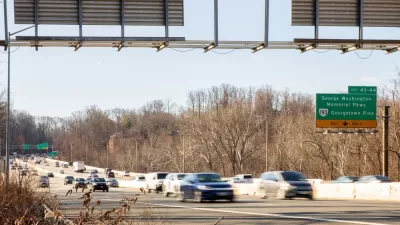A new study in 8 countries says yes, contrary to government predictions.
From the report's abstract, authored by Adam Millard-Ball and Lee Schipper:
"Through decomposing passenger transport energy use into activity, modal structure and modal energy intensity, we show that increases in total activity (passenger travel) have been the driving force behind increased energy use, offset somewhat by declining energy intensity. We show that total activity growth has halted relative to GDP in recent years in the eight countries examined. If these trends continue, it is possible that an accelerated decline in the energy intensity of car travel; stagnation in total travel per capita; some shifts back to rail and bus modes; and at least somewhat less carbon per unit of energy could leave the absolute levels of emissions in 2020 or 2030 lower than today."
Melinda Burns at Miller-McCune writes:
"Most of the eight countries in the study have experienced declines in miles traveled by car per capita in recent years. The U.S. appears to have peaked at an annual 8,100 miles by car per capita, and Japan is holding steady at 2,500 miles."
FULL STORY: A Road Less Traveled

Planetizen Federal Action Tracker
A weekly monitor of how Trump’s orders and actions are impacting planners and planning in America.

Chicago’s Ghost Rails
Just beneath the surface of the modern city lie the remnants of its expansive early 20th-century streetcar system.

San Antonio and Austin are Fusing Into one Massive Megaregion
The region spanning the two central Texas cities is growing fast, posing challenges for local infrastructure and water supplies.

Since Zion's Shuttles Went Electric “The Smog is Gone”
Visitors to Zion National Park can enjoy the canyon via the nation’s first fully electric park shuttle system.

Trump Distributing DOT Safety Funds at 1/10 Rate of Biden
Funds for Safe Streets and other transportation safety and equity programs are being held up by administrative reviews and conflicts with the Trump administration’s priorities.

German Cities Subsidize Taxis for Women Amid Wave of Violence
Free or low-cost taxi rides can help women navigate cities more safely, but critics say the programs don't address the root causes of violence against women.
Urban Design for Planners 1: Software Tools
This six-course series explores essential urban design concepts using open source software and equips planners with the tools they need to participate fully in the urban design process.
Planning for Universal Design
Learn the tools for implementing Universal Design in planning regulations.
planning NEXT
Appalachian Highlands Housing Partners
Mpact (founded as Rail~Volution)
City of Camden Redevelopment Agency
City of Astoria
City of Portland
City of Laramie





























